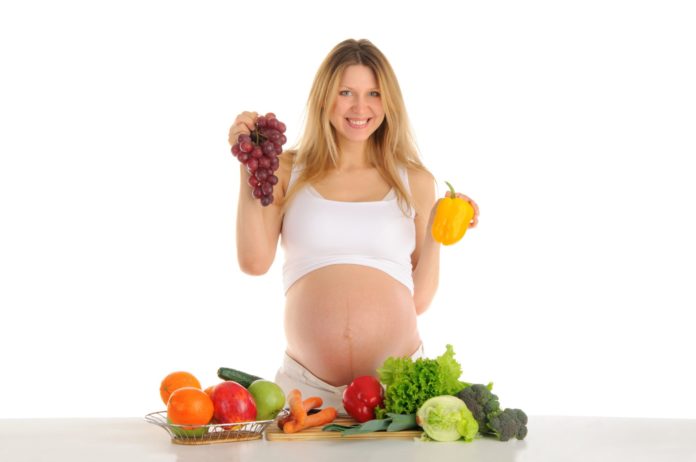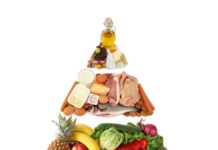In the midst of Australia’s obesity epidemic, there’s a lot of information about avoiding unhealthy, sugary foods and weight gain. In this climate we are rarely reminded (and only a few of us really need to be), that under-eating can also be dangerous for health. This is particularly true when you’re pregnant, a time when your body is building a baby and demands more nutrients to do its job.
Avoiding under-nutrition in pregnancy is important, but avoiding unhealthy, fatty or sugary snacks is also important when you’re pregnant. So how can you ensure you get all the additional pregnancy building nutrients and calories you need to gain weight and build a baby, whilst avoiding the high-fat, high-sugar nasties?
Food for life – literally
Making a baby in your body requires a lot of energy and nutrients, so it is necessary to eat more. You wouldn’t let tradies go hungry after a big day at the building site, and you shouldn’t let your body go hungry after a big day of building a person.
More energy and nutrients doesn’t mean stacking on the sour cream at every meal, or adding burger and chips treats. But, especially if you’re a little on the skinny side when you enter the baby-building business, you definitely need to eat more and plan your diet to ensure you are getting enough of all the right foods.
If you don’t eat enough, it can lead to malnutrition, meaning your body is not getting enough calories to maintain its health; you may lose weight, your muscles may deteriorate and you’ll feel weaker. During pregnancy you should be gaining weight and if you don’t lose weight, you may still be malnourished. Even if you were overweight to begin with, pregnancy is not a good time to try and lose weight – you still need to add some baby pounds.
Good things in small packages
In addition to ensuring that you eat enough to gain weight, you’ll need to ensure you get plenty of micronutrients.
It’s not just babies that are small and lovely. Micronutrients you get from your food are also good things in very small packages. You may not be able to see them but they are certainly there, working hard for you. Eating well means you can get all the micronutrients you and your foetus need from your diet.
Tiny packages of folate (found in foods like beans and spinach) help your baby’s spinal cord, nervous system and brain develop. For little bones and teeth, you’ll need to make sure you eat plenty of little calcium packages, found in dairy foods. Iron and vitamin A are also very important. You can talk to your doctor about what pregnancy vitamin supplements might be appropriate to supplement your diet.
If I don’t eat enough, neither does my baby
Your foetus can’t pop down to the Deli for a snack – the only way it can get what it needs is through you. The foetus begins demanding food from your body as soon as you become pregnant, and has particular demands for micronutrients. It takes a lot of micronutrients and energy to make all the new cells which the sperm and egg divide into.
Eating well before pregnancy means you’ll have some extra micronutrients in storage, and your foetus will have all the fuel it needs. In the first month or so, the brain and spinal cord is developed and folate deficiency during this time is the most common cause of abnormalities.
Holy Guacamole: What can happen if I don’t eat enough?
Not eating enough while you’re pregnant puts your health and the health of your foetus at risk. Women who are underweight before pregnancy have a higher risk of being malnourished during the pregnancy. It’s harder to play catch up on nutrition after you get pregnant, so future Mummies need to start ramping up the fruit and veg before the pregnancy test shows a smiley face.
Underweight women are also more likely to experience preterm birth, have a still birth or miscarriage, and experience pregnancy complications such as preeclampsia. Make sure your iron is up too, because you have a higher risk of anaemia if you become pregnant when you’re iron deficient.
It’s not just pregnant Mums who feel the effects of malnutrition. The unborn baby is also affected and may be born at a low birth weight or with mental retardation. There are other disorders that can occur too, like respiratory, intestinal or neurological problems. Low birth weight is associated with greater illness throughout the rest of the baby’s life. Babies born to malnourished women are more likely to die in the first month of life.
So remember, when you eat well, so does your baby.
Baby, you rock me
A lack of nutrition in the womb can actually affect the foetal metabolism and predispose the baby to type 2 diabetes before it is even born. As well as metabolic problems, undernutrition in the womb can also increase the risk of cancers, cardiovascular disorders, infectious diseases and kidney problems. You want to give your child birthday presents, not diabetes, so give your child the gift of health by eating well while you’re pregnant.
Eat and be merry
Even though you can’t drink booze when you’re pregnant, you will definitely be merry if you eat well and your baby is healthy.
Eating well doesn’t just mean staying away from the burgers and chips, it also means getting enough to fuel the spectacular event of creating a baby – from scratch!
More information
 |
For more information on health risks associated with malnutrition and micronutrient deficiency before and during pregnancy, see Under-Nutrition Before and During Pregnancy. |




 (6 votes, average: 3.67 out of 5)
(6 votes, average: 3.67 out of 5) 






